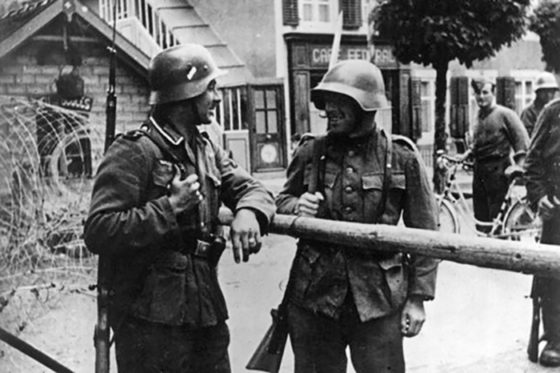
“Five grim visionaries and their remarkable predictions
about the coming war.”
FEW COULD HAVE ANTICIPATED the assassination of the Archduke Franz Ferdinand and the subsequent crisis that triggered the First World War. Yet for years leading up to 1914, a number of observers, writers and statesmen warned that Europe was indeed headed for a cataclysm. A rampant arms buildup, strident imperialism and a byzantine alliance system among the world’s ‘great powers’ had produced the powder keg, such seers warned. All that was needed to touch off the conflagration was single spark. Yet like the mythical Cassandra who could foresee the coming disaster but was cursed with an inability convince those around her, few in Europe heeded the dire forecasts. Ultimately, millions paid with their lives for the failures. Here are five of these grim visionaries and their uncanny predictions about the coming war.

The “World War”
August Wilhelm Otto Niemann coined the phrase Weltkrieg or “world war” a decade before the outbreak of hostilities. In his 1904 book of the same name, the prolific 65-year-old Hannover writer foresaw a coming clash between two powers in particular: Great Britain and Germany. He made his forecast against the backdrop of a decade-long naval arms race between the two estranged nations. Surprisingly, Niemann welcomed the prospect of war. In the opening pages of his book, he identifies England as the German Empire’s mortal enemy and stresses that only by defeating it, along with France and Russia, could his country ever hope to achieve greatness. [1]

The Durnovo Memorandum
Pyotr Durnovo, a government minister of Tsar Nicholas II, also saw the coming conflagration. In fact, he put his warning to Russia’s monarchy in writing. Just five months before the assassination of the Archduke, the 69-year-old civil servant penned a memo in which he cautioned the leadership to avoid antagonizing Germany at all costs. He maintained that the Triple Entente alliance, of which Russia was a part, would commit the nation to a contest between the formidable German Empire and Britain and France.

Once hostilities had commenced, Durnovo correctly predicted, the Tsar’s ill-prepared and lumbering army would be decimated, creating a golden opportunity for revolutionaries at home to foment rebellion. It’s not known if Nicolas ever bothered to read the paper that so accurately mapped out his own royal downfall. It was found among a cache of official documents after the Romanov king was forced from his throne. [2] He and his family would later be famously shot by the Bolsheviks.

Air War
Overshadowed by his more famous work about invaders from Mars, H.G. Well’s lesser-known novel, The War in the Air, foretold a global conflict in which America would simultaneously fend off aerial onslaughts from Germany and Japan, both of which would be keen to expand their empires at the expense of the United States. More significantly, Wells also envisioned opposing fleets of armed airships doing battle far above the clouds. Meanwhile, squadrons of German-built steampunk-style flying contraptions known as Drachenfliegers would launch bombing raids against Manhattan and other cities. Published less than five years after the Wright Brother’s first flight at Kittyhawk, North Carolina, the famed sci-fi pioneer deftly exploited the public’s growing anxiety over the prospect of war, as well as the insatiable fascination with new technology. While Wells was off the mark in his forecasts (Germany never did attack New York militarily) his predictions that cities would be targeted from the skies were remarkably prescient.

‘Is War Now Impossible?’
More accurate were the predictions made by the Polish author Jan Gotlib Bloch. Fascinated by Prussia’s lighting-fast defeat of France in 1870, the banker-turned-futurist produced a massive six-volume work on how the industrial revolution would change the very nature of conflict. Is War Now Impossible?, published in 1898, warned that more accurate rifles, high-explosive artillery and machine guns would end mobility on the battlefield and force armies of the future into a bloody stalemate of trench warfare. In an attempt to break the deadlock, the warring nations would mount increasingly massive (and ultimately futile) offensives in which millions would be slaughtered needlessly. Meanwhile, on the home front, governments would be forced to mobilize industry to produce ever more weapons and ammunition, ultimately threatening their own economic stability and ushering in an era of political revolution. Bloch, who was 62 when his book was published, hoped that Europe’s leaders would want to avoid the coming catastrophe. He died in 1902, his warnings all but ignored.

New World Order
Perhaps the most chillingly accurate prediction of the First World War came from the noted socialist and intellectual Frederich Engles. In the introduction to the 1887 book Zur Erinnerung fur die Deutschen Mordspatrioten or a “Reminder to Germany’s Killer Patriots,” he anticipated a struggle between his homeland and the rest of Europe that would be marked by violence on a scale “hitherto unimagined.”

Mass armies will “strip Europe barer than a swarm of locusts,” he wrote and visit “the depredations of the Thirty Years’ War compressed into three to four years.” The financial and human toll would be so great, Engles warned, that it would lead to political collapse throughout Europe. “Crowns will roll into the gutters by the dozen, and no one will be around to pick them up,” he wrote. Lucky guess?
(Originally published on MilitaryHistoryNow.com on Sep. 3, 2014)
Sources
http://akarlin.com/2010/05/great-war-prophets/
https://www.marxists.org/archive/marx/works/1887/12/15.htm
http://en.wikipedia.org/wiki/Pyotr_Durnovo
http://www2.stetson.edu/~psteeves/classes/durnovo.html
http://en.wikipedia.org/wiki/The_War_in_the_Air
http://en.wikipedia.org/wiki/Jan_Gotlib_Bloch










The author suggest, disingenuously, that ‘millions died’ because these predictions were not heeded. Unfortunately, in the pre-Internet age, very few people would have read one of these accounts. And even if they read one, it is highly unlikely that readers would have had access to the others, all written in the ‘foreign’ language (presumably) of the author. In the end, however prescient, and fascinating to a 21st Century audience, these five accounts were simply coincidental and broadly inconsequential in their contemporary setting.